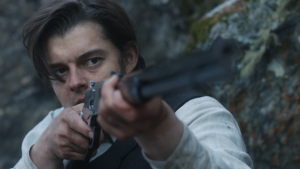Last spring I composed a BA thesis, which shed light on the disgustingly honourable ethics of Martin McDonagh’s protagonists in In Bruges and Seven Psychopaths. Although my BA work will not be directly referenced in the upcoming series of articles, it still provides the ideological basis of my MA thesis about Western “cowboy” principles in Eurowestern movies. Since who else could be so controversial and thus so intriguing as those who rarely speak and always shoot to kill?
 For this reason, I will analyse the Austrian take on Western cowboy morality: The Dark Valley, released in 2014. To summarize the plot: the hero, Greider, journeys back from the New World to enter the realm of a secluded Alpine community where prima nocta as a despotic tradition flourishes. Through a considerable amount of body count, he liberates the village from its blight – the Brenner family who exerted their control over the village for generations. Right at the end, however, a question concerning the nature of freedom is posed that proves to be even more fascinating when Greider’s inherent American identity is construed. On top of it all, Greider arrives as a travelling daguerreian artist who has the means to “free” others with his art; truly, examining his identities requires a great investigation. Therefore, further research will anticipate a study of his gripping personae as Artist, Son, Avenger, and Liberator in the framework of Western cowboy principles.
For this reason, I will analyse the Austrian take on Western cowboy morality: The Dark Valley, released in 2014. To summarize the plot: the hero, Greider, journeys back from the New World to enter the realm of a secluded Alpine community where prima nocta as a despotic tradition flourishes. Through a considerable amount of body count, he liberates the village from its blight – the Brenner family who exerted their control over the village for generations. Right at the end, however, a question concerning the nature of freedom is posed that proves to be even more fascinating when Greider’s inherent American identity is construed. On top of it all, Greider arrives as a travelling daguerreian artist who has the means to “free” others with his art; truly, examining his identities requires a great investigation. Therefore, further research will anticipate a study of his gripping personae as Artist, Son, Avenger, and Liberator in the framework of Western cowboy principles.
What I am aiming to do with this article-series is to discover relevant secondary sources and develop the main arguments for my thesis. Also, I may find other movies relating to The Dark Valley and corroborate my claims by drawing parallels between said possible movies. Incidentally, the director, Andreas Prochaska, referred to Drive and Shameless as inspirations for Greider’s character – it will turn out whether this idea will pan out contributory to my work.

